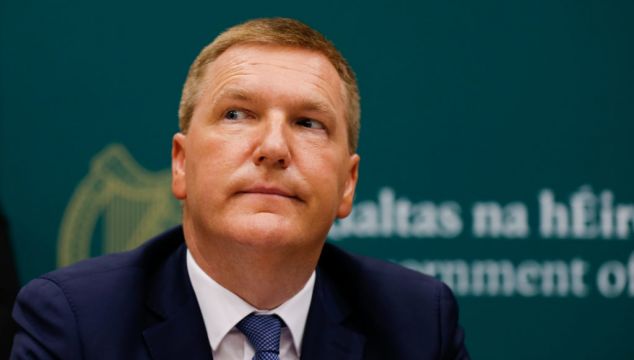Income from corporation tax was “on the upside of expectations” in November, Minister for Finance Michael McGrath has said.
Figures published on Tuesday show total tax receipts for the 11 months to the end of November amounted to €82 billion, which was €4.5 billion (5.8 per cent) ahead of the same period last year.
Speaking on RTÉ radio’s Morning Ireland, Mr McGrath pointed out that there had been three consecutive months where the data had been weak relative to the same month last year.
He added that November was always the most significant month for returns, because of the corporation tax returns and also the self-assessed income tax returns.
It was likely that there was a link that was sector-specific, even company-specific, the Minister said.
However, the nature of such returns is volatile, he warned, adding that the Government has consistently been stressing this point.
“These receipts are very volatile in nature. We had weakness for three months, and now we have volatility on the upside, which is good.
“This is positive news, and we should welcome it because it does mean overall that we will now achieve our overall budgetary targets for the year, a significant surplus.”
Mr McGrath said the returns put the State in a strong position heading into the new year, but again warned of the “high level of concentration in relation to multinationals, and even within that a relatively small number of multinationals.”
He added: “That's why we have to be so careful in the decisions that we make with these receipts. We certainly cannot spend them on permanent recurring expenditure, our taxation commitments.
What we are doing is we are significantly increasing public capital investment. That means building more homes, more schools, more investment in public transport and so on, and then we will now be proceeding to set up the two new funds that I announced in the budget to meet costs that are coming our way in the coming years. Demographic costs, but also climate costs associated with the climate transition, the cost of digitalisation and so on.”
Mr McGrath said that given the volatility of such tax receipts, they could not be relied upon in the future. However, he added that reduced corporation tax in the future is not going to happen overnight.
“We have very significant changes in terms of the international corporation tax landscape. We are just legislating now for the transposition of the EU minimum tax directive, which is the OECD global deal. So the rate will move to 15 per cent.”
He explained the 15 per cent-rate, which will onlyy apply to the largest companies, with turnover in excess of €750 million, will commence from January 1st, “but the additional revenues that come from that increased rate don't flow until mid 2026”.
Other pillars of the OECD agreement remained under negotiation, Mr McGrath added, such as the reallocation of taxing rights to larger markets, which he warned will come at a cost to Ireland.
“We believe our central scenario will remain broadly stable, but we do believe in time that the level of receipts could begin to fall off as you have the full implementation of pillar one and indeed pillar two of the OECD agreement.”
Donohoe departure?
Commenting on reports that his Government colleague, Minister for Public Expenditure Paschal Donohoe may be eyeing a move to the International Monetary Fund (IMF), Mr McGrath said any such decision was a personal matter for Mr Donohoe.
“What I would say is that he has all of the qualities and credentials and experience necessary to fulfil that role, and isn't it a great thing that a member of the Irish Government is being associated with the position of managing director of one of the most important global economic bodies?
“It's a matter for him to come to a personal view ultimately. I know what he has said through his spokesperson about the desire to serve the full term as president of the Eurogroup and to contest the next election.
“My own view is that we should allow Minister Donohoe the time and space as this develops over the months ahead to come to a final view on this.”
Mr McGrath also noted that it is not yet clear whether the IMF's current managing director, Kristalina Georgieva, will seek a second term.
As for his own future aspirations, Mr McGrath was asked if he would like to be European Commissioner, to which the Fianna Fáil TD said he loves the job he has, adding that he wants to bring forward another budget and contest the next general election.







